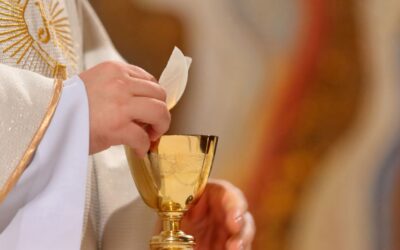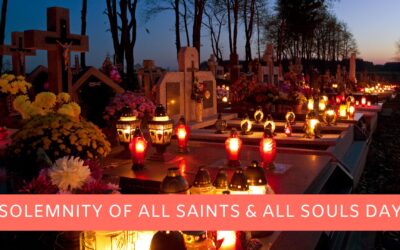A Message from Father Nathan
My dearest people closest to my heart!
God bless you and your generous heart.
St. Augustine, bishop of Hippo in
North Africa (354 to 430 AD)
This week we are going to celebrate one of my favorite saints. I love to read, talk, and quote about him
and from him.
He is one of the great intellectuals of the church. St. Augustine, bishop of Hippo in North Africa (354 to 430 AD), was one of the great minds of the early Christian Church, a theologian
whose ideas forever influenced the Roman Catholics. However Augustine did not come to Christianity by a straightforward path. At an early age, he began searching for the truth in the popular pagan philosophies and cults of his day. His young life was also
scarred by immorality. The story of his conversion told in his book Confessions, is one of the greatest
Christian testimonies of all time.
Humble Beginnings | Pagan Father & a Christian Mother
Augustine was born in 354 in Thagaste, in the North African province of Numidia, now Algeria. His father, Patricius, was a pagan who worked and saved so his son could receive a good education, Monica, his mother, was a committed Christian who prayed constantly for her son.
From a basic education in his home city, Augustine progressed to studying classical literature, then went to Carthage for training in rhetoric, sponsored by a benefactor named Romanianus.
Bad company leads to bad behavior
Bad company leads to bad behavior. Augustine took a mistress and fathered a son, Adeodatus who died in 390 A.D. Led by his hunger for wisdom, Augustine became a Manichean. Manicheism was founded by the Persian philosopher Mani (216 to 274 A.D.). taught dualism, a rigid division between good and evil. Like Gnosticism, this religion claimed secret knowledge is the route to salvation. It attempted to combine
the teachings of Buddha, Zoroaster, and Jesus Christ.
Monica, His Mother Prays
All the while, Monica had been praying for her son’s conversion. That finally happened in 387, when Augustine was baptized by Ambrose, the bishop of Milan, Italy. Augustine returned to his birthplace of Thagaste and was ordained a priest. A few years later he was made bishop of the city of Hippo. Augustine possessed a brilliant intellect yet maintained a simple life, much like a monk. He encouraged monasteries and hermits within his bishoporic in Africa and always welcomed visitors who could
engage in learned conversation. He functioned more as a parish priest than an aloof bishop, but throughout his life he was always writing. Augustine’s two Confessions, tells the story of his sexual
immorality and his mother’s unrelenting concern for his soul. He sums up his life for Christ, saying,
“So I may cease to be wretched in myself and may find happiness in you.”
City of God, written near the end of Augustine’s life, was partly a defense of Christianity in the Roman Empire. The emperor Theodosius had made trinitarian Christianity the official religion of the empire in 390. Twenty years later, the barbarian Visigoths, led by Alaric I, sacked Rome. Many Romans blamed
Christianity, claiming that turning away from the ancient Roman gods had caused their defeat. The remainder of the City of God contrasts the earthly and heavenly cities
May God bless you all.
Ever wanting to be faithful to your service,
— Fr. Sahayanathan Nathan
Set up Online Giving.
You can make a one-time donation or set up recurring gifts.
Join our Parish Family
Register in the parish, so that it’s easy to become a confirmation sponsor or Godparent.
Want to Lend a Helping Hand?
Find volunteer opportunities and share your talents.
Need a Helping Hand?
We are here to help. Request home visits, send a prayer request. For urgent needs call 954.943.3684
Past Messages from Father Nathan
From The Desk Of Father Nathan | November 27, 2022
The Season of Advent. This week Marks the beginning of Advent — a time of spiritual preparation for the coming birth of Christ…
From The Desk Of Father Nathan | November 20, 2022
Celebrate Thanksgiving. So Many Reasons to Be Thankful! First for the blessing and protection God has given us. Second, for our democratic government and the prosperity, we enjoy. Third, for our freedom of speech and religion. And finally…
From The Desk Of Father Nathan | November 13, 2022
Mass is the source of the Summit of all our prayers. Mass should be an extension of our life. Life should be an extension of our Mass. Mass is our source of strength for our life. Mass iswhat keeps the Church moving and holy…
From The Desk Of Father Nathan | November 06, 2022
Meet our New Maintenance Man + surveillance camera project update. We have a new maintenance man here at the parish. He is still on his orientation and acclimating day by day. His name is Rodger. He is being taught all the necessary things about the church and its…
From The Desk Of Father Nathan | October 30, 2022
This week, we have two important feasts that we are going to celebrate. One would be the Solemnity of All Saints and the second ALL Souls Day. Let us try to understand what these feasts mean to us.
The Solemnity of All Saints commemorates all those holy men, women, children, martyrs,…
From The Desk Of Father Nathan | October 23, 2022
Important updates and information for the upcoming holiday season and welcoming our seasonal parishioners back to their Florida homes and the 2023 Pilgrimage tot he Holy Land.






